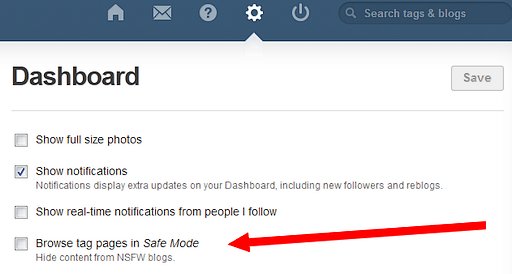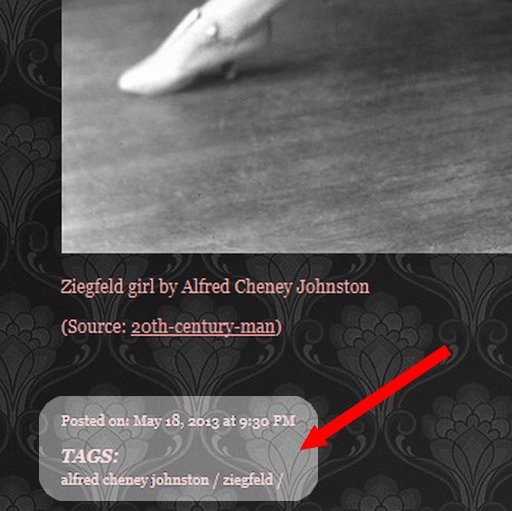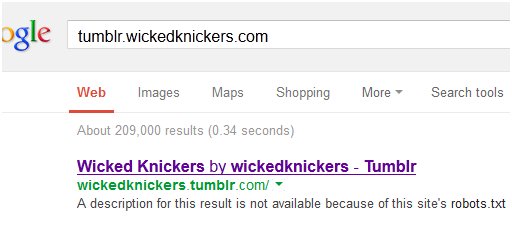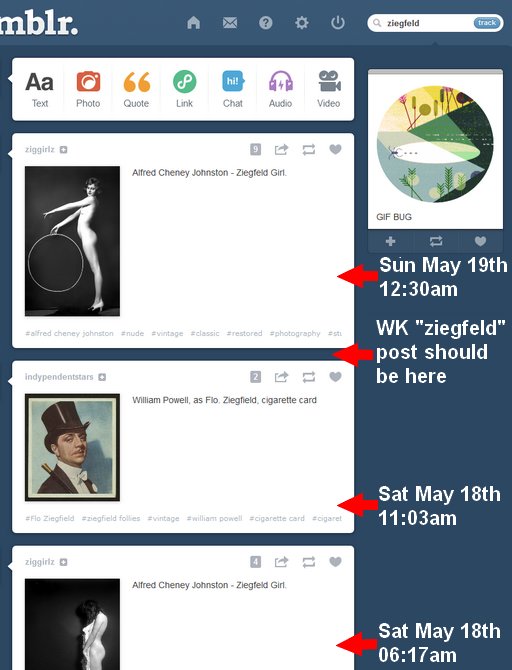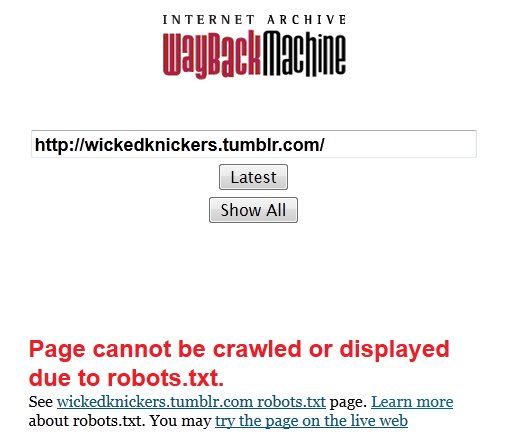Saturday, July 20th, 2013 -- by Bacchus
It’s time to be very clear about the words “NSFW” and “Adult” in the Tumblr context. They mean different things. Until recently, users were faced with two self-flagging options. This is the relevant screenshot from my May 15 post:
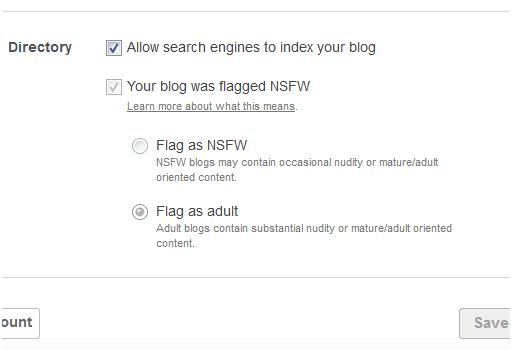
Here’s how Tumblr’s page on Understanding NSFW and Adult Blogs explained the difference, then and now:
Please respect the choices of people in our community and flag your blog as NSFW or Adult from your blog Settings page.
- NSFW blogs contain occasional nudity or mature/adult-oriented content.
- Adult blogs contain substantial nudity or mature/adult-oriented content.
Note what’s not present (this will be important later). There’s nothing there about commercial porn sites or affiliate links. The difference between NSFW and Adult is the extent of nudity or “mature/adult-oriented” content. If it’s occasional, your blog should be flagged NSFW; if it’s “substantial”, your blog should be flagged Adult. When we talk about “porn on Tumblr” everybody is talking about Tumblrs that should be flagged Adult. We’re talking about the blogs that are all porn, all the time, the raunchier the better. Accept no substitutes!
So, that’s the Tumblr policy as it’s been for at least the last several months. I am going into this so carefully because Tumblr has been (IMO deliberately) using these words to deflect inquiries and confuse the press. Ask Tumblr about porn or Adult-flagged blogs and they will come back with a phrase about NSFW blogs. The questioner may think he or she just got an answer, but in reality he got a load of bullshit about something else. Everybody needs to watch out for this going forward, if only so you can avoid all the incoherent tech press articles by reporters who never understood that this distinction exists and who (typically and somewhat reasonably) think “Adult” and “NSFW” are plain-language synonyms as they normally are.
OK, that’s the history. What’s the news?
Yesterday, at some time after I posted about the plain falsehoods in that press email from the Tumblr Head of Communications Katherine Barna, Tumblr founder David Karp posted this article to the Tumblr Staff blog, which is “The official feed from the people behind Tumblr.” Karp’s post suggests that changes are coming, and that’s reinforced by a new yellow-highlighted “This Page is out of date and is in the process of being updated” legend on the Understanding NSFW and Adult Blogs page. (That’s the one that just got updated on Thursday when Tumblr started admitting they were excluding Adult blogs from their internal search indexing. Yup, now it’s “out of date”.)
So what’s the awesome new Tumblr plan to reassure us all that Tumblr has heard our feedback? Well, it looks like the new plan is to hide all the seach-banned Adult-flagged blogs from the interface, deploy a new set of vilifying lies about these now-even-harder-to-find blogs, and carry on talking about the NSFW category only. Possibly I’m uncharitable. So let’s look at Karp’s post together, shall we?
It begins:
All, we’ve heard from a bunch of you who are concerned about Tumblr censoring NSFW/adult content. While there seems to be a lot of misinformation flying around, most of the confusion seems to stem from our complicated flagging/filtering features.
It opens like a classic corporate non-apology backtrack. “We hear you, it’s a damned shame you’ve all fallen for the terrible misinformation that’s flying around, however we are complicated which may have prevented you from understanding how awesome we are.” Note the “NSFW/adult” terms being used together in this nonspecific way. Moving on:
Let me clear up (and fix) a few things:
1. Last year, we added “Safe Mode” which lets you filter out NSFW content from tag and search pages. This is enabled by default for new users and can be toggled in your Dashboard Settings.
Here he’s using “NSFW” to mean both “NSFW” and “Adult”. Of course the Safe Mode applied to both NSFW and Adult-flagged blogs (once the Adult category was added) and it filtered them both out by default.
As some of you have pointed out, disabling Safe Mode still wasn’t allowing search results from all blogs to appear. This has been fixed.
This appears to be another flat lie. It may well be true of blogs with the NSFW tag, but Karp says “all blogs” here, and I can show you how to disprove that. Remember, Tumblr’s own little check-box chart says that NSFW blogs are indexed by Tumblr search and Adult ones are not. If they’re not indexed, how can they hope to show up when a user turns off Safe Mode? Now, watch me prove it, using a recent post on Fifi’s wonderful Feeling Is First Tumblr. Is it flagged as Adult? Yes it is; you have only to navigate to http://feeling-is-first.tumblr.com/robots.txt to see the deadly disallow-all instruction.
So, Fifi posted this yesterday (Friday, July 19th) and she tagged it #phonograph:

So, Feeling Is First is a Tumblr blog, and David Karp says that turning off the default Safe Mode in your Tumblr account “wasn’t allowing search results from all blogs to appear” but has been fixed. Well, was it actually fixed? See for yourself. Log into your Tumblr dashboard, check that you’re not in Safe Mode, and type “phonograph” into the search box. As I write this, the search is returning precisely two results from yesterday for the “phonograph” tag and neither of them is Fifi’s post.
A Karp apologist might remind us that Tumblr isn’t indexing Adult-flagged blogs, so there are no search results from these blogs to appear; they weren’t being blocked by Safe Mode, they just don’t exist. My response to that would be, it tortures the language beyond its limits. You can’t brag about enabling “search results from all blogs to appear” while chortling behind your hand about an entire class of porn blogs for which you aren’t generating search results. Especially not in a post about a controversy over disappearing porn blogs.
Karp goes on:
Some search terms are blocked (returning no results) in some of our mobile apps. Unfortunately, different app environments have different requirements that we do our best to adhere to. The reason you see innocent tags like #gay being blocked on certain platforms is that they are still frequently returning adult content which our entire app was close to being banned for. The solution is more intelligent filtering which our team is working diligently on. We’ll get there soon. In the meantime, you can browse #lgbtq – which is moderated by our community editors – in all of Tumblr’s mobile apps. You can also see unfiltered search results on tumblr.com using your mobile web browser.
There’s another whole blog post to be done on how Apple’s anti-porn apps market is chilling adult discourse on the modern internet, but that’s for another day. Let’s focus on Karp’s last sentence here: “You can also see unfiltered search results on tumblr.com using your mobile web browser.” Yesterday I called out Tumblr Head of Communications Katherine Barna for lying when she said “Users can also find all content with Tumblr search in their mobile web browser.” Karp has cleaned this up to the extent of replacing “all content” with “unfiltered search results”. Since Tumblr says it is not indexing Adult-flagged blogs, there are no search results from them to include in unfiltered results. So Karp avoids the direct lie here. But the deception remains. Karp doesn’t get to brag about “unfiltered search results” while excluding an entire class of supposedly-welcome blogs from search indexing.
But now we get to the truly-astonishing “demonize, vilify, and disappear” discussion where Karp acknowledges the genuinely Adult-flagged blogs for the first time:
Earlier this year, in an effort to discourage some not-so-nice people from using Tumblr as free hosting for spammy commercial porn sites, we started delisting this tiny subset of blogs from search engines like Google. This was never intended to be an opt-in flag, but for some reason could be enabled after checking off NSFW → Adult in your blog settings. This was confusing and unnecessary, so we’ve dropped the extra option. If your blog contains anything too sexy for the average workplace, simply check “Flag this blog as NSFW” so people in Safe Mode can avoid it. Your blog will still be promoted in third-party search engines.
Here is the genuine bad news for Adult bloggers on Tumblr. According to the soon-to-be-revised policy, the Adult-flagged blogs were formerly a perfectly-welcome part of the Tumblr community, and porn bloggers on Tumblr were asked to voluntarily flag as such if they posted “substantial” nudity. Now Tumblr is claiming this was all an accident and they are burying the Adult-flagged blogs behind an additional barrier of invisibility. They’ve removed the radio button (that somehow accidentally wrote itself into the interface) for Adult blogs and they will only use an NSFW flag going forward. In the interface, Adult-flagged blogs will no longer exist. You’ll be NSFW or nothing — and, Karp promises, NSFW blogs will (continue to be) visible to the search engines.
So, what about those gazillions of porn bloggers already on Tumblr? You know, the ones this controversy is actually about? The ones Karp now newly claims were “a tiny subset” of “not so nice people” “using Tumblr as free hosting for spammy commercial porn sites”? What’s going to happen to them?
Let’s be clear about the fast one Karp is trying to pull here. Tumblr’s community guidelines have long prohibited the creation of blogs that were “for the primary purpose of affiliate marketing.” If caught, the penalty for this (according to some threads I’ve perused on adult webmaster forums) was deletion of the offending blog. At first, Tumblr’s enforcement was lax; but as abuses piled up, they went through a period where they were deleting blogs that had just a single affiliate link. So Karp is lying when he claims that the Adult flag was only intended for “spammy commercial porn sites”. The defining characteristic was “substantial nudity”, not commercial spam. The affiliate spammers were a whole different problem with an entirely different and more draconian solution. Karp knows this. This is not a failure to communicate. This is deliberate deception aimed at marginalizing Tumblr’s porn bloggers and justifying that marginalization.
So what’s going on? Karp has gone out of his way to demonize the blogs that were flagged as Adult. That suggests to me that we won’t be seeing an “all is forgiven” removal of the search engine exclusion for formerly Adult-flagged blogs that are now (by the new definition) merely NSFW. Instead, it looks like the blogs already flagged as “Adult” will stay that way, only now the very existence of the “Adult” category will be invisible in the interface. And anybody who complains? They’re just “not so nice people” trying to scam Tumblr out of free hosting for their commercial spam.
If Karp were honestly trying to fix this, he’d have announced that the search engine blocks for blogs with substantial nudity were being removed. He didn’t say anything of the sort. Instead, he lied, and claimed that they were only supposed to be applied to spammers in the first place. But his own soon-to-be-revised policy documents show the lie; they show that the Adult flag and the search engine exclusion were intended for everyone showing substantial nudity. That’s the history Tumblr is now trying to sweep under the rug. Tumblr has buried its porn blogs, and now it’s trying to scratch dirt over the evidence with its rear claws.
Karp goes on:
Aside from these fixes, there haven’t been any recent changes to Tumblr’s treatment of NSFW content, and our view on the topic hasn’t changed.
Here he uses the NSFW word (and that “recent”) to ignore the actual controversy, which is over the search limitations on Adult (not “NSFW”) blogs that were implemented several months ago. He closes with some happy boilerplate:
Empowering your creative expression is the most important thing in the world to us. Making sure people aren’t surprised by content they find offensive is also incredibly important and we are always working to put more control in your hands.
Sorry for all of the confusion. If you have any more concerns or suggestions on how we can make these features clearer or more useful, please email us!
My predictions for the future:
- When the “in the process of being updated” Understanding NSFW and Adult Blogs page gets updated, all references to the former “adult” category will be gone. No search blocking (internal or external) will be disclosed on the page.
- The millions of currently Adult-flagged blogs (the ones that have “substantial nudity”) will still have the no-longer-visible-in-the-interface Adult flag, they will still have a robots.txt block in place, and they still won’t show in Tumblr’s internal searches.
- Tumblr’s porn blog community will be invisible and unacknowledged. The suits will call this “winning”.
There is another possibility. The correct thing for Tumblr to do (if they were sincere about replacing the dual system with a single, simpler, NSFW flag) would be to reflag all the Adult-flagged blogs as NSFW. But if they were going to do that, would Karp have lied about the reason the Adult flag was implemented? I do not think so.
Somebody on Reddit said it best, yesterday: “So passes Tumblr, son of Geocities, and cousin to Digg. May it rest in cache.”
Except, of course, that the good stuff won’t be in anybody’s cache, because of robots.txt…
UPDATE: Wow, that was fast. In just three hours, the first of my predictions has already come true: the Understanding NSFW and Adult Blogs page has been updated and it looks just like I thought it would. No charts, no checkboxes, no more “adult” category, it’s all NSFW and there’s no mention of anything being excluded from search engines.
However, it looks like I missed the mark on my other two predictions (time will tell). I’m getting preliminary reports in my comments (and my own random tests agree) that the hated robots.txt is vanishing from many or most of the formerly-hidden Adult-flagged blogs. Karp still deserves censure for telling a big hairy lie about the history and reason for the Adult-flagged groups (and for attempting to deceive the world into thinking these were principally self-flagged by accident rather than auto-flagged by Tumblr) but perhaps the reason for the deception was to avoid the perception of a back-track, rather than to conceal the deeper burying of adult blogs that I feared was coming. But if the robots.txt files that are going away stay gone, this is actually a huge win for adult content on Tumblr.
Similar Sex Blogging:









